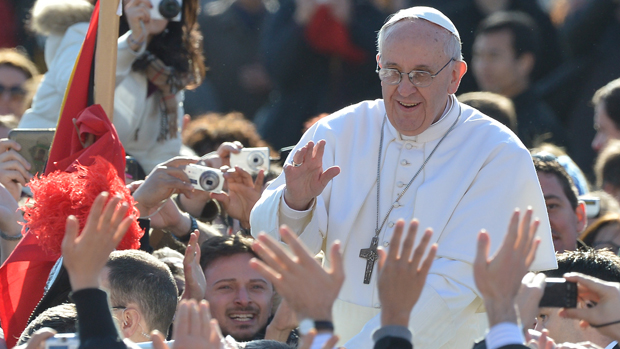Media savvy Pope Francis is 'Ronald Reagan' of religion
Shy Argentine cardinal emerges as warm, engaging speaker who knows how to use the press

A free daily email with the biggest news stories of the day – and the best features from TheWeek.com
You are now subscribed
Your newsletter sign-up was successful
JORGE MARIO BERGOGLIO was often described as a shy man with an aversion to journalists. But as today's inauguration signals the official start of his papacy, there are clear signs Pope Francis "knows how to work the media", says Time.
As a cardinal, Bergoglio preferred to address his congregation rather than reporters, Time says. And when sections of the Argentine media accused him of "silent complicity" during the years when the country was ruled by a brutal junta, his aversion turned to open hostility. "Journalists sometimes risk becoming ill from coprophilia," he said at the time.
Since the conclave elected him Pope, Francis has enjoyed a much warmer relationship with the press. Addressing a group of several thousand journalists from around the world last Saturday, he began: "My dear friends…". There were cheers and several reporters shouted "Viva!".
The Week
Escape your echo chamber. Get the facts behind the news, plus analysis from multiple perspectives.

Sign up for The Week's Free Newsletters
From our morning news briefing to a weekly Good News Newsletter, get the best of The Week delivered directly to your inbox.
From our morning news briefing to a weekly Good News Newsletter, get the best of The Week delivered directly to your inbox.
Francis has the advantage of succeeding Pope Benedict, a man whose "stiff, rather formal" public demeanour reflected his background as an "intellectual, a German theologian steeped in traditional values", says Religion News Service. Compared to Benedict, Francis is fluid, affable and noticeably more modern.
The new Pope's speaking style is "more like that of an actor than a preacher: his tone is intimate, with touches of humour and folksiness, but he never loses command of his audience", says Time. As a speaker, the politician he most resembles is Ronald Reagan. He can also depart from the script when necessary. As he thanked the media for covering the conclave, he looked up and said with a smile: "You've worked, eh? You've really worked."
Like any good media operator, Pope Francis understands the potency of symbolism and how to use it. He declined to sit on the papal throne after he was elected and left the Vatican in a bus with the other cardinals rather than use the papal limousine. "When he appeared on the balcony above St Peter's Square, he wasn't wearing the red papal cape or the customary golden cross, but a simple white cassock and the iron crucifix from his days as bishop."
His understanding of the media extends to damage control. When questions about his role during the junta years "threatened to derail the narrative of renewal" the Vatican responded with "uncharacteristic speed and force", says Time. A statement described the accusations as "slanderous, defamatory and motivated by leftist anticlericalism". The story was nipped in the bud and the celebratory mood resumed.
A free daily email with the biggest news stories of the day – and the best features from TheWeek.com
Dennis Redmont, a professor of international media at the University of Perugia, is impressed. Pope Francis has the chance to become a "symbol that resonates", he says. "I think he'll be less Ratzinger and more Dalai Lama."